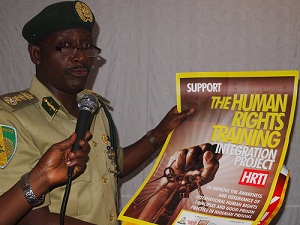
There are existing evidences to show that the United Nation Standard minimum rule for the treatment of prisoners including those relating to the prison officers are not followed in practices. (Amnesty International Feb. 2008) PRAWA is working with all human Rights interest groups with the support of British high Commission to improve the awareness and observance of international human rights principle and good prison practices in Nigeria.
“Improving the awareness and observance of international human rights principles and good prison practice in Nigerian prisons ….”
The project has three major components viz:
- Training and capacity building of Prison Officers on Human Rights and Good Prison Practice and development of resource materials.
- Sensitization of Prisoners on their rights, duties and responsibilities.
- Establishment of effective complaints and redress mechanisms to monitor level of success of the project in the Nigerian prisons.
Training and capacity building of Prison Officers on Human Rights and Good Prison Practice and development of resource materials.
Training a pull of regional, state and prison training institution based trainers on international Human Rights Standards and Good Prison Practice is the core objective of this component. Three States: Lagos, Kaduna and Enugu states and the FCT are the focus currently. We are utilizing training methodologies such as case studies and role plays. It noteworthy to say that PRAWA has developed increased expertise on utilizing these methodologies.
We also implement prison-based training activities in targeted states. This involves the trained regional and state-based trainers carrying follow-up training on the subject matter in all the prisons in the targeted pilot states and FCT.
The prison locations to be reached in this activity include:
- Enugu State – Enugu Prisons, Nsukka Prisons, Oji River Prisons and Ibitolu Prisons
- Lagos State – Kirikiri Female prisons, Kirikiri Maximum Security Prison, Kirikiri Medium Security Prisons, Ikoyi Prisons and Badagry Prisons
- Kadunna State – Kadunna Central Prisons, Kafanchan Prisons, Zaria Prisons, Birin Kwari Prisons and Kadunna Borstal Centre
- FCT Abuja – Kuje Prisons and Suleja Prisons
Encouraging follow-up regular training/sensitization on human rights and good prison practice in targeted prisons using the weekly prison Thursday lecture slots is also another methodology we employ.
Production of handbook reflecting the rights and practice guidelines such as a pocket handbook based on the prison standing Order and the United Nations Standards Minimum Rule for the treatment of Prisoners (UNSMR); as well as a production of Prisoners pocket handbook highlighting their rights, duties and responsibilities as contained in the standing Order and the UNSMR.
Sensitization of Prisoners on Their Rights, Duties and Responsibilities:
- We develop relevant Information Education and Communication (IEC) materials for prisoners in English and local languages. These highlight the rights, duties and responsibilities of prisoners based on the United Nations Standard Minimum Rule for the Treatment of Prisons, the Nigerian Prison Act, the Standing Order and other related documents.
- We distribute produced materials and carry out other sensitization activities to increase the awareness of prisoners on their rights, duties and responsibilities.
- We encourage Prison officers to carry out follow up activities to sensitize prisoners on their rights, duties and responsibilities. This we do through the establishment, use of peer educators and sensitizers in the prison drawn from amongst fellow prisoners.
Establishment of Effective Complaints and Redress Mechanisms to Monitor Level of Success of the Project in the Nigerian Prisons
PRAWA encourages the establishment of effective processes for receiving the treatment of complaints from prisoners and provision of redress at the Nigerian Prisons Service prisons at state, zonal and national headquarter levels. The PRAWA developed handbook for prisoners will provide a good guide on this process.
In this activity we encourage the effective utilization of internal and external monitoring mechanisms with respect to monitoring the project impact and the implementation and compliance to international human rights and good prison standards.
The project expected output are as follows:/span>
- Increase in the number of prison officers trained on human rights and good prison practice.
- Increase in the numbers of prisoners sensitized on their rights, duties and responsibilities.
- Production/establishment of documentation and processes to enhance sensitization of prisoners on complaints, redress and monitoring mechanism.
The project sustainability and expected long term impact include in-built activities within the project that ensures sustainability these includes the following:
- The use of trainers and train the trainers approach.
- The establishment of regional, state prison and prison training Institution Based Trainers and platforms who will implement follow up training.
- Development of a process aimed at mainstreaming the training and sensitization activities through a no cost integrated approach utilizing the weekly Thursday lecture slots of the Nigeria prison Service in the targeted prisons.
- Production of resource materials for training, sensitization and practice reference for prisoners and prison officers on human rights and good practice.
- Development of Integrated processes to encourage effective treatment of prisoners’ complaints, redress and monitoring of prisons.
- The use of peer educators/sensitizers’ model to carry out the sensitization of prisoners.
The anticipated long term impact of project includes the following:
- Improved conditions of treatment and processes which are compliant to international human rights standards in the targeted Nigerian Prisons.
- Improved staff-inmates relationship in the targeted Nigerian Prisons.
- Reduction in Inmates’ violence/riots in the targeted Nigerian Prisons.
- Development of a model strategy for the integration of human rights training and good prison practice that maybe adapted in similar initiatives in other prisons/states/regions and prison training institutions in Nigeria.
